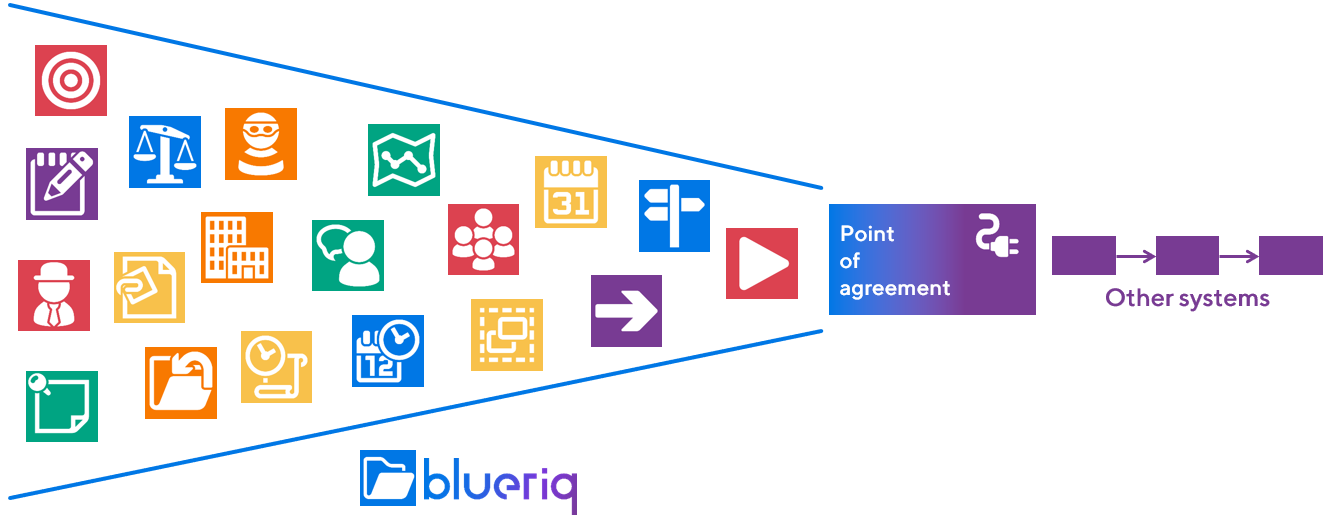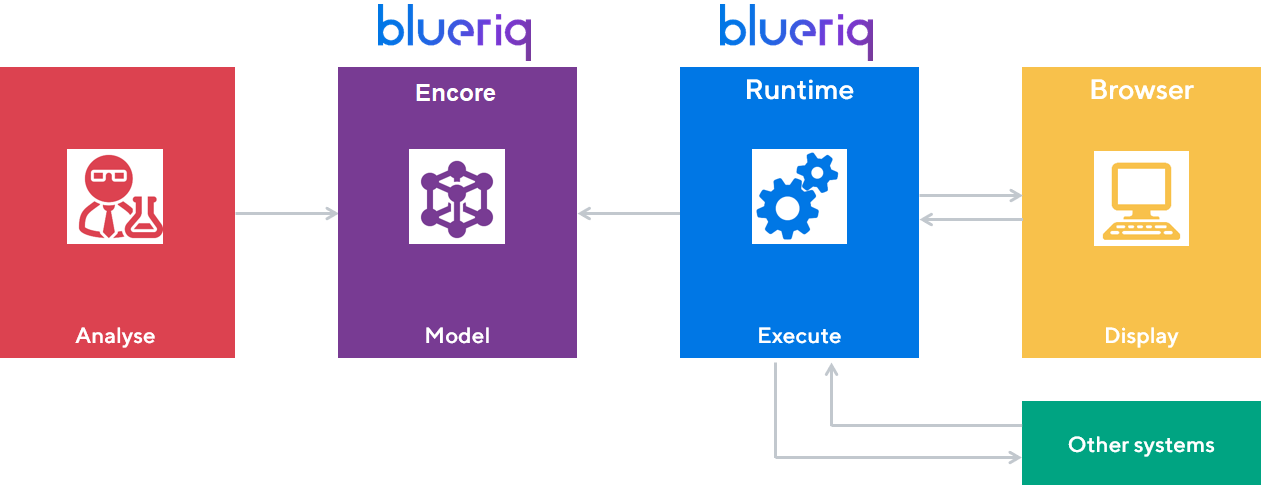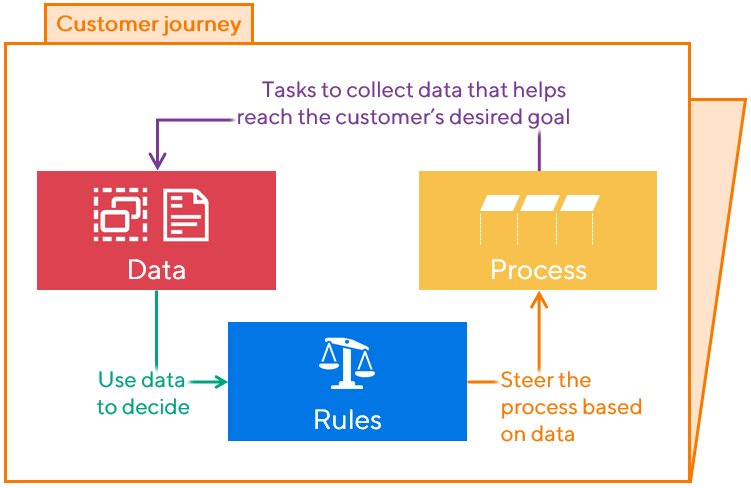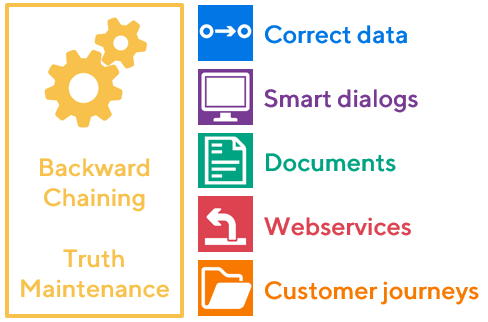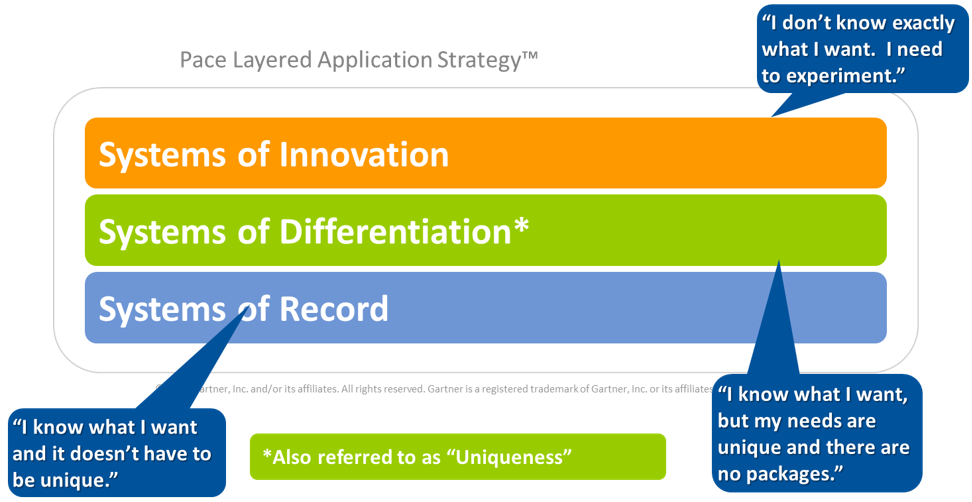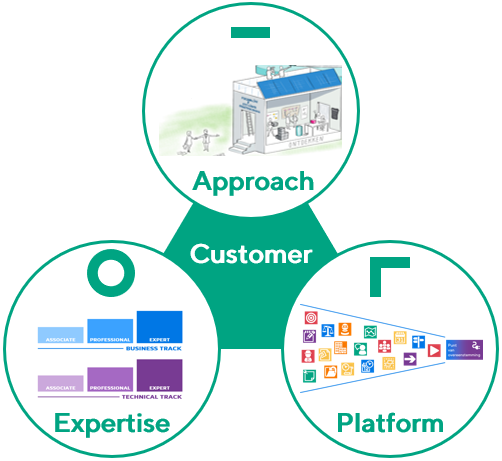You are viewing the documentation for Blueriq 17. Documentation for other versions is available in our documentation directory.
Getting rid of unnecessary translations and achieving predictable quality
Instead of a code driven environment, Blueriq is model driven platform. Our customers can read the models. This way time extensive and error prone translations between business, information analysts and programmers are minimalized. Therefore, organizations are enabled to quickly react on changes and to focus on delivering business value.
Our models deliver insight which result in predicable quality. Because Blueriq is a platform, a modeler doesn’t change anything in the technical base. Therefore, integration and security risks are strongly reduced.
Below, a schematic outline is given on how Blueriq makes this possible.
In Studio, models are creates and maintained. The runtime executes models, which are displayed in a browser, an app or an application.
See Blueriq Components for a more detailed description of the different components in Blueriq.
What do you create with Blueriq?
Solutions for customer journeys exists of different elements; user interaction, a process and all necessary decisions. Blueriq supports all needed functionality in one platform and connects with commodity IT to retrieve or save data, to enrich a case or to check authorizations.
Customer Experience Management
Blueriq’s Customer Experience Management manages which information is being retrieved from the customer or is shown on the screens. By making this information context sensitive, a personal user experience and a smart dialog is created, without unnecessary questions and in the right tone of voice. This way we make it possible for different target audiences and roles to work together in the same case.
Dynamic Case Management
To provide a perfect customer journey, Blueriq uses Dynamic Case Management (DCM) with a case as central subject.
Where user interaction orchestrates what happens within a task of a customer journey, DCM orchestrates the whole case. It determines who must perform the next step or how the customer journey should be treated.
In contrast to Business Process Management (BPM) that follows a specific sequence, DCM is completely rule driven. Only tasks that are relevant for the customer are shown at the right moment and are mandatory or optional, depending on the rules. This way processes, authorizations and timelines are guarded, but at the same time there’s optimal flexibility.
All different variants of the same process are modelled in one model. From straight through processing to processes that are handled manually as the sequence is unpredictable or processes that are so complex an expert needs to assess it.
Decision Management
In every process a lot of decisions are being made. This can be formal decisions, for example if a certain subsidy may be granted. But answers to simple questions can also be decisions that triggers a certain situation. These decisions are often related with law and legislations, policy documents or design decisions. As decisions are being modelled as a Business Rule, this is made explicit and easy to relate.
Dependencies between rules and data can be easily shown with a Decision Requirements Graph (DRG). A DRG shows the rules and data being used to determine a value (decision). This DRG scans Blueriq for the complete model of every possible path to a decision, as well as solution at the customer for an individual decision.
Typical Blueriq
Blueriq makes clear decisions which makes our platform unique.
- The customer and the customer journey are centralized, third parties join in in this journey.
- User interaction should always be custom made. All users use the same solutions. The rules determine which functionality someone can see or use. This depends of a specific situation, role of the user and the phase in which the process is in etc.
- Decisions, dialogs, documents and processes are all being controlled by our Rule Engine. This way we secure a consistent way of working and guarantee traceability to law and legislation.
- To capture complex processes with an unpredictable order in a Business Process Management Notation (BPMN) is impossible. Therefore, Blueriq chooses for a process based on clear pre- and postconditions determined by rules.
- Blueriq is centered in the commodity IT as a spider in the web, getting all the information needed from the different source systems. As a system of differentiation, it’s no transactional system or database. Blueriq brings all information together in a customer journey. The results are being reported to a system of record.
- Tone of Voice and content are being separated as well as knowledge and process. This results in the fact that technical en functional parts can be maintained separately. A solution can easily be distributed with different layout, in different languages, on different devices or channels.
Three times Blueriq
With Blueriq we don’t only refer to our company and our platform, we also refer to the expertise and craftmanship from our certified specialists. We train our colleagues to work conform a certain approach.
Blueriq Platform aims to eliminate unnecessary transfers between business and IT. Therefore, our specialists that realizes the solution is intimately involved with the customer. Also, our specialists are involved designing the desired business process.
We learn our specialism to model with Blueriq and working according to this successful approach by following specific courses in our Blueriq Academy. We keep developing our tracks to get the best our or specialists. This trinity, approach; specialists and our unique platform, completes our service.
Maintainable Blueriq
Blueriq offers extensive functionality to maintain the created solutions. This starts with integral version management that enables our specialists to work with a copy from a specific version. This way we make sure our teams can work independently on different releases or features, without interfering with each other.
With Blueriq Control Center a model can be easily pushed from a development environment to Test-, Acceptance- or Production environment. This way we can keep track which models are running on which environments.
Our Blueriq Runtime can run multiple versions of a solution at the same time and, if you’re running on a development environment, seeing real time changes made in a model.
To control and maintain the quality of the models we make use of unit tests in Blueriq Studio, and the Business Model Analyzer.
Extend your knowledge?
Watch the demo’s and download whitepapers on www.blueriq.com, take a look at our courses at www.blueriq.com/academy.
Here on my.blueriq.com you can find all helpfiles, release notes, documentation and Design Guides. For other questions you can always reach out to support@blueriq.com.
